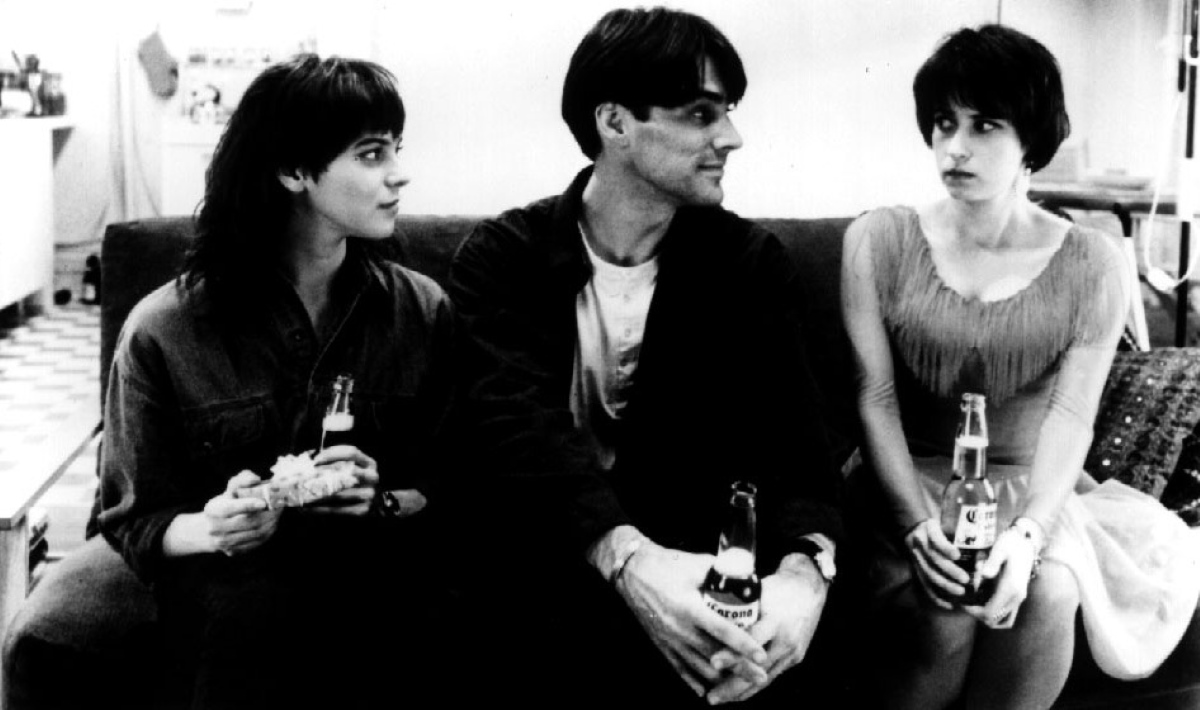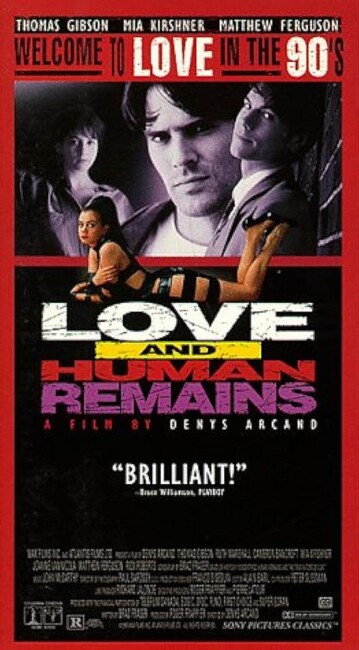Crew
Director – Denys Arcand, Screenplay – Brad Fraser, Based on his Play Unidentified Human Remains and the True Nature of Love (1989), Photography – Paul Sarossy, Music – John McCarthy, Production Design – Francois Seguin. Production Company – Max Films/Atlantis Films/Telefilm Canada.
Cast
Thomas Gibson (David McMillan), Ruth Marshall (Candy Nesbit), Cameron Bancroft (Bernie), Joanne Vannicola (Jerri), Matthew Ferguson (Kane), Rick Roberts (Robert), Mia Kershner (Benita), Aidan Dervin (Sal)
Plot
Waiter David MacMillan passes through a series of casual gay pickups, claiming that that is all the emotional fulfillment that he needs. He strikes up a friendship with Kane, a seventeen year-old busboy who is unsure about his sexuality. David’s roommate Candy Nesbit is unrequitedly in love with David. Candy becomes involved with both a somewhat obsessive lesbian Jerri as well as a male bartender Robert. At the same time, a serial killer is killing women in the city and tearing their earrings off as souvenirs. Candy then uncovers evidence that seems to point to Robert being the killer.
Love & Human Remains, an adaptation of a popular play Unidentified Human Remains and the True Nature of Love (1989), is a strong and effective examination of love and sex in the 1990s. It fairly much covers all conceivable variations from gay male and female to hetero sex and the increasingly less closeted issue of S&M and bondage, to those that prefer sex to love and vice versa, from uncertainty about one’s sexual identity to women who unrequitedly love gay men to the spectre of AIDS. The film is directed by Quebecois filmmaker Denys Arcand who previously made the internationally acclaimed Jesus of Montreal (1990) and would go onto The Barbarian Invasions (2003) and The Age of Ignorance (2007).
It is clear what drew Denys Arcand to the play – the story swims in the same rich sea of metaphors as Jesus of Montreal did. The film’s characters all want something – sexuality in the 90s, screenwriter/original playwright Brad Fraser (himself gay) says, is either a shiftless search for fulfillment or else denial. Although in the end summation, Fraser eventually condemns those who engage in serial sex without commitment. It is here that the film ultimately moralises (perhaps conservatively and perhaps disappointingly).

However, the way Brad Fraser makes his moral point is breathtaking. The analogy drawn between the serial killer and serial relationships is a striking. In the moment that Ruth Marshall goes to bed with Rick Roberts and he convinces her he doesn’t need a condom, the analogy made between the serial killer who may hide behind anybody’s face and the killer virus that may hide inside anybody’s body is made strikingly. Even more startling is the climactic encounter between Thomas Gibson and the killer. The killer’s dismissal that his victims were “just secretaries and hairdressers” sounds alarmingly close to the same character’s previously demonstrated willingness to simply use women as sexual partners and dump them and Thomas Gibson’s similar if less callous dalliances. This swimming play of analogies between AIDS, random sex and serial killing is quite brilliant.
Brad Fraser’s script is a very good one, even in terms of its dynamics. The red herring developments about who may be the killer is well done. Fraser allows the characters to carry the plot and there are some fine moments when they are each given the opportunity to lay their souls bare. There are a series of extremely good performances right across the board from the whole cast. Especially good is the lithely good-looking Thomas Gibson, just before he went onto fame on tv’s Chicago Hope (1994-2000), Dharma and Greg (1997-2002) and Criminal Minds (2005– ). His sharp and witty line in deadpan sarcasm is enormously appealing.


